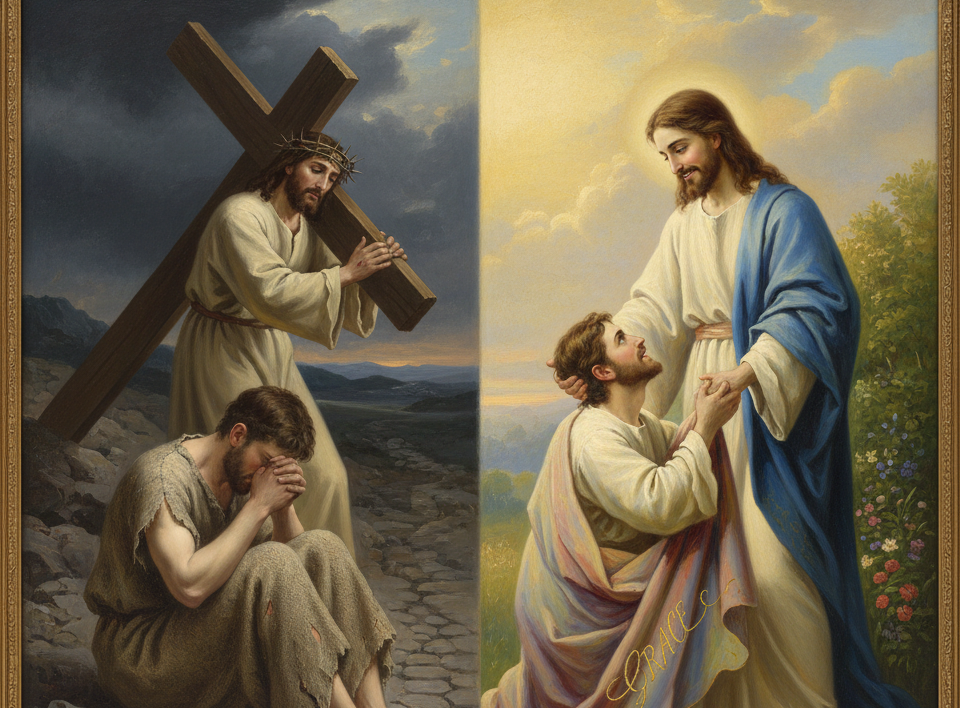Divine Retreat Centre UK – Official Website

The 7 ways in which God guides us
June 18, 2024
How To Forgive
July 11, 2024When he had said this, he cried with a loud voice, ‘Lazarus, come out!’ The dead man came out, his hands and feet bound with strips of cloth, and his face wrapped in a cloth. Jesus said to them, ‘Unbind him, and let him go. (John 11:43-44)
Almost too good to be true, and undeniably a wondrous and divine manifestation! Every single time I go through the scriptures, I look with awe at the story of Lazarus being raised from his tomb.
Why do so many of us Christians believe in miracles?
Our Christian belief system is interlaced with a tapestry of indisputable miracles that God the Father, and His son Jesus Christ have laid before us. Miracles are instruments to strengthen our faith, and establish God’s supremacy over His creation.
Miracles and Magic
While skimming through the multitude of religions on earth, one greatly marvels at the fact that miracles and magic are precariously perched, and a very thin line exists between them.
Christianity took shape during an era when all religions had a certain powerful conviction that magic and miracles are the result of following certain rituals, attracting demonic and supernatural beings through powerful chanting and wearing of charms. We see the average Egyptian’s heavy reliance on witchcraft and supernatural manifestations, and wonder if magic and miracles could be interchangeable.
Nonetheless, Christians have always adhered to the belief that the miracles in the Bible are way above what we categorize as ‘magic’. Whilst the Bible acknowledges black magicians, demons, devils, and fallen angels, and the magical powers that they possess that can greatly destroy human kind, miracles are unquestionable works of God, that produce instantaneous results, that ‘your heart skips a beat’- the audience is stunned, petrified, and devoid of the strength to question the authenticity of it all.
Miracles defy rationale, and cannot be explained in clear logical terms.
Why do Christians believe in Miracles?
Psalm 33:8-9-Let all the earth fear the LORD; let all the inhabitants of the world stand in awe of him. For he spoke, and it came to be; he commanded, and it stood firm.
Our belief in miracles was handed down over generations, as our ancestors believed in the supreme power of God. Old Testament is replete with demonstrations which were dramatic and authentic, that the people of God clung to these validations from God, and looked towards Him to be led to divinity.
The miracles in the Old Testament were sudden expressions of God’s approval, or wrath towards His people. They were done to show His dominion and compassion towards them, so that they know that He is real, and must be trusted and obeyed. However, miracles in the Old Testament were not always pleasant actualizations, acting at times as a medium to punish the disobedience and arrogance of the people of Israel.
Jesus and His Miracles
Moving to the New Testament, miracles took on a whole new meaning and appearance. They always projected an idea of healing, hope, faith, and trust in the Son of God, and the promise of a redeemer who will help us come out of the sins that we have committed.
Jesus performed miracles that can be categorized into different genres such as miracles that emphasized his power over death (raising of Lazarus from the dead), miracles of physical healing (healing of the sick), miracles that demonstrated his supremacy over nature, including plant and animal kingdoms (arresting of the storm on the Sea of Galilee, Balaam’s donkey speaking in a man’s voice, cursing of the fig tree), and miracles of expulsion of demons.
One must note here that Jesus’ miracles were done out of compassion for His people, and not to glorify His name or establish supremacy over the people, as God the Father was accustomed to in the Old Testament. Once when they asked Him to perform a miracle, Jesus responded thus, “An evil and adulterous generation seek after a sign, and no sign will be given to it except the sign of the prophet Jonah.” (Matt. 12:39).
Our Lord refused to fall into the trap of the devil, in the wilderness. We also see him refusing to come down from the cross. He refused to do miracles that contradicted His mission as the son of God, or those that will not lead to the salvation of the people. Jesus’ miracles were done in unison with The Father, and in total humility and surrender towards the will of His Father.
When miracles were performed by Jesus, even the Pharisees and the teachers of the law never denied His power, but merely tried to attribute His prowess to some demonic source. Even the miracles done by Jesus’ disciples were accepted without much resistance, even though the enemies tried to mute its impact, as they felt threatened by the supremacy of the man who proclaimed to be the Son of God.
Miracles and Faith
It is worthwhile to note that the intensity of Jesus’ miracles were directly linked to the faith of the believer, as He himself proclaimed many times :
Matthew 21:21- Jesus said to them, “For sure, I tell you this: If you have faith and do not doubt, you will not only be able to do what was done to the fig tree. You will also be able to say to this mountain, ‘Move from here and be thrown into the sea,’ and it will be done.
In Jericho, Jesus encounters a blind man, Bartimaeus. He recognizes Jesus’ voice, and exclaims, “Jesus, Son of David, have mercy on me!” Unflinching, he continues to call out to Jesus. Bartimaeus reveals his desire to see again, and Jesus proclaims, “Go, your faith has made you well.” Bartimaeus’ sight is restored, a seemingly impossible feat, and one that defies all logic and explanations.
The profound faith of the believer generated a surprising phenomenon!
Jesus promises us that all things we ask for in prayer, will be rewarded if we have faith. The gospel contains miracles that clearly demonstrate that faith is indispensible for a miraculous outcome under any circumstance.
Going by this promise, we wonder why God doesn’t appear to us anymore, or why He does not always give us miracles when we ask.
We must not underestimate the power of holiness and spirituality in the manifestation of miraculous outcomes. Miracles do happen today too, maybe not in the same intensity as it used to before. We no longer see Lazaruses being raised from the tomb, or the sick being healed real time. However, we do encounter miracles and testimonies from time to time that increase our faith in God.
God may not give us miracles on demand, and we must not test His power or patience. He is the creator, and is entitled to do as He pleases. He may or may not grant your fervent prayers, and at times, it might look as if He is turning a deaf ear or blind eye to your pleas and sufferings. Understand that God aims at your greater good.
It is not through the seeking and attainment of miracles that we demonstrate our Christian faith, but rather through suffering, surrender, and hope that we make a greater impact on fellow humans.
Let us be humble and faithful Christians who surrender to the will of God, and believe that everything is under His control.
Amen




